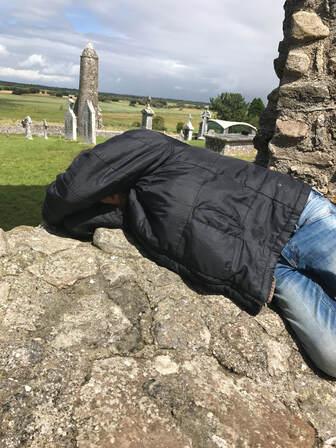 John 6:1-21 Who is this? In last week’s Gospel reading we heard that Jesus and the disciples had no time to rest because people continuously came to Jesus, day after day, looking for healing, seeking salvation. This week we hear that even though Jesus crossed to the other side of the sea… a large crowd kept following him, because they saw the signs that he was doing for the sick. So… Jesus went up the mountain and sat there with his disciples and when he looked up and saw a large crowd coming towards him, Jesus said to Philip, “Where are we to buy bread for these people to eat?” The story then continues with the well known ‘Feeding of the five thousand’ before Jesus withdraws again up the mountain because he realises that the crowd want to make him king; before coming back down to the shore and the account of Jesus walking on water. Who is this Jesus? Who is this that turns five loaves and two fish into enough food to feed a multitude? Who is this that walks on water? Who is this? The crowd thought Jesus may have been a prophet or a king, perhaps the disciples were left just wondering, who is this? Who is this? This is not a bad question to ask. This is not a bad place to be on the spiritual journey. During this current Covid-19 lockdown in Sydney I have spoken to some people who are busier than ever and I have spoken to some people who are bored out of their minds and to others who are worried about having no income and what the future holds. Whatever our situation let us ponder this question: Who is this? We may need some help to ponder this question? We can spend a whole lifetime tossing this question around in our minds, approaching question from an entirely intellectual stance and end up knowing a lot about Jesus but perhaps not knowing Jesus as we might know a close friend or lover. In Colossians 2:9,10 Paul writes: For in Christ the whole fullness of deity dwells bodily, and you have come to fullness in Christ… (read this several times, sit with the words, notice the words rather than trying to understand them with the mind). What does this mean about God’s relation to us and our relation to God? How are we connected? What is this fullness? Who is this that dwells within us in fullness? Ask the question, but instead of thinking about it, be still, be silent, listen… Who is this? We tend not to like silences in this day and age. Many of us find silence very uncomfortable. We don’t want to sit still and listen and watch and observe the world around us. We are easily bored, wanting mental stimulation or to be entertained or challenged. For those who have too much free time during a lockdown perhaps this could be a good opportunity to look within, to face some of the things that stop us from living life to the full, that deflect us from exploring the fullness within because we are scared of what may come up from our past. But remember beyond all that pain and shame there is a full life within us wanting, willing to live, awakening us to (its) presence and mystery and wonder. Who is this? Photo: Clonmacnoise, County Offaly, Republic of Ireland
0 Comments
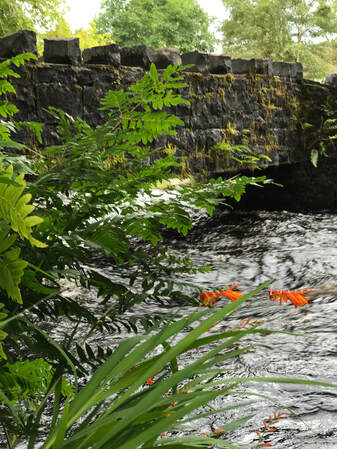 Mark 6:30-34, 53-56. Do we live our life or does life live us? Jesus said to them, "Come away to a deserted place all by yourselves and rest a while." For many were coming and going, and they had no leisure even to eat. Mark 6:31 One thing people notice when forced to lockdown due to Covid-19 is how much time they seem to have compared to their usual busyness. The busyness is like a drug, an addiction; some hate it, some love it. Some people hate the busyness because they feel they are not living their life. They feel they are living someone else’s life. They feel that life is flying past them, that time is running out. Some people love the busyness because it prevents them asking tough questions about life, they like that they don’t have to face themselves and ask what is it all about? What is the meaning of life? People can get very busy as followers of Jesus. Jesus’ disciples were exhausted. People continuously came looking for healing, looking for life. They didn’t even have time to eat. Even when they tried to get away by boat to a quiet deserted place for some rest, people recognised them, and hurried to get there before Jesus got there. They were lost like sheep without a shepherd. They were hungry and wanted food. They were ill and wanted to be healed. They wanted life. They knew Jesus had something and they wanted it, desperately. A question I have been reflecting on is this: Do we live our life or does life live us? At first glance that question sounds like we are being hoodwinked, being tricked; taken for a ride, that somehow life could be using us, conning us, that we are not in control. Have you ever screamed aloud, “It’s my life and I’ll do what I want’? We feel we should be in control of our life, masters of our own destiny rather than some mysterious force using us or stealing our life away. What is more important, our life, or the life that lives through us? Let’s add a couple of Scripture verses to our time of reflection: Jesus said, I came that they may have life, and have it abundantly. (John 10:10) Jesus said, those who try to make their life secure will lose it, but those who lose their life will keep it. (Luke 17:33) Jesus said, I am the way and the truth and the life. (John 14:6) Paul wrote, and it is no longer I who live, but it is Christ who lives in me. And the life I now live in the flesh I live by faith in the Son of God, who loved me and gave himself for me. Galatians 2:20 What do these verses say to us about life? Is life something we can possess? Is it really ours? What is this life that Jesus speaks of and offers us? Jesus, the word of life, comes into this world opening up something to us, connecting us to the source which is life itself, to God. God is more than the giver of life, God is life, the one in whom we live and move and have our being. (Acts 17:28) So, I ask the question again, do we live our life or does life live us? We are we one with this life. Whether we live or die, this life will always be with us. Remembering that, even in the busyness, may just be our salvation. May this source, this endless life, flow out through us in rivers of living water. Amen Photo: Galway, Republic of Ireland 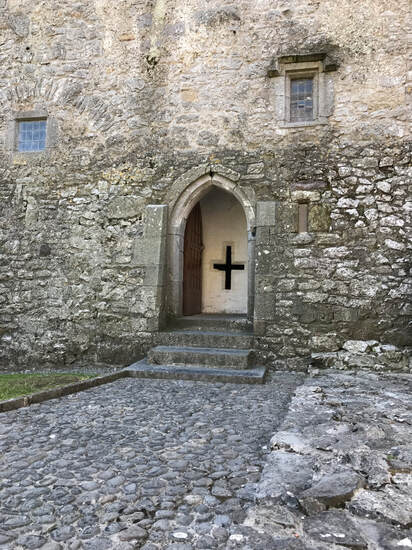 Mark 6:14-29. Love lays down power, power takes up love. King Herod heard of it, for Jesus' name had become known. Some were saying, "John the baptizer has been raised from the dead; and for this reason these powers are at work in him." Today’s reading is a story about the use of unjust power. It is heartless and brutal. What a mean man Herod was to take a life simply to save face! If front of his guests Herod dare not back down from granting a request to his daughter, especially after he had boasted that Herodias could have anything she wished even up to half his kingdom. So, when Herodias said she wanted John’s head Herod had to follow through with his promise. Not to do so would have made him look foolish in front of his guests. Been seeing as maintaining power at all costs was the most important thing, the unfairness of an unjust execution without trial was of no consequence. The story of John the Baptist's execution is the negative consequence of speaking truth to power. John had confronted Herod in much the same way as Nathan the prophet had confronted King David about his adultery and murder of Bathsheba’s husband hundreds of years beforehand. Unlike David who repented in response to the word of God, King Herod did not repent. Instead, he had John the Baptist imprisoned and eventually beheaded. Herod had turned his back on God’s ways. He thought of himself as above the laws of the land and above God’s laws. The call to repent is not just a message for the people of the villages, it is not just about personal salvation, the call to repent is for all rulers: for kings and queens, presidents and prime ministers and all in authority. So often religion is a consolation for people, something we escape to from the world into, a place where we can find peace and calm, safety and comfort. The religion of John the Baptist and Jesus was no safe option, no sanctuary from the world, no promise of freedom from violence or escape from the world. In fact, those who took up the words of Jesus and put them to practice in their lives would find themselves thrust into many situations that were out of their control and in situations that led to imprisonment, torture and death. According to Paul writing in Ephesians 6:12 they were confronting not flesh and blood but the cosmic power of the present darkness and the spiritual forces of evil in the heavenly places. King Herod heard rumours about Jesus. “Some were saying that John the baptizer has been raised from the dead; and for this reason, these powers are at work in him." The inclusion of this verse gives a hint about what might be to come: that Jesus may be raised from the dead. In a sense Jesus is John the Baptist raised from the dead in that the voice of God cannot be silenced and the ways of God cannot be obliterated. Evil cannot overcome good, good will always come back. Good can rise out of evil but evil cannot rise out of good. As Martin Luther King said, “We shall overcome, we shall overcome one day.” Those in power do have more than one choice. They can use their power to oppress, to control, to kill, to destroy, to keep people in poverty; or they can use their power to love, to ensure a just and equitable society for all people. Power did not choose love that day, neither did power choose justice. In order for the world to change, power must take up love. Love involves justice and fairness. It means putting the rights of others above our own pride and place and position. Love lays down power and power takes up love. Photo: Cahir Castle, County Tipperary, Republic of Ireland 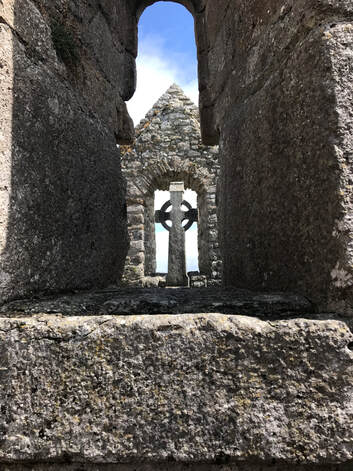 2 Corinthians 12:2-10 Mark 6:1-13 2 Corinthians 12:9, 10 but God said to me, "My grace is sufficient for you, for power is made perfect in weakness." So, I will boast all the more gladly of my weaknesses, so that the power of Christ may dwell in me. Therefore I am content with weaknesses, insults, hardships, persecutions, and calamities for the sake of Christ; for whenever I am weak, then I am strong. St. Paul discovered an amazing secret of the Gospel: that power is made perfect in weakness. Paul realised that when he was weak, he was actually strong because that is when God’s grace flowed out from within him. Jesus’ disciples discovered this secret of the Gospel when Jesus sent them out to preach among the villages. He sent them out with very little: sandals, a staff and authority over unclean spirits. He sent them out in weakness, they were vulnerable and dependent entirely on the hospitality of others. Jesus did not send them out with great power. In their weakness the power of God shone through. If they had been strong in themselves the power of God would not have been seen. It was in their weakness that they experienced God’s strength. It was when they were weak, that they were really strong in God’s power. Why would anyone be content with weakness? We spend our lives trying to be strong and avoiding weakness? We want to be strong, wealthy, healthy, successful! No one wants to be thought of as weak. We want to be winners not losers. Barney Zwartz of John Mark Ministries says, “Weakness is at the heart of the Christian message, (its) a paradoxical and liberating truth…” Irish Catholic priest Daniel O'Leary says, “This is what love does. It gives away its power. It renders itself destructible. All this runs against the grain of our competitive and controlling nature. How can weakness be understood as the secret of true love?" Spend some time reflecting on the power that comes through weakness. 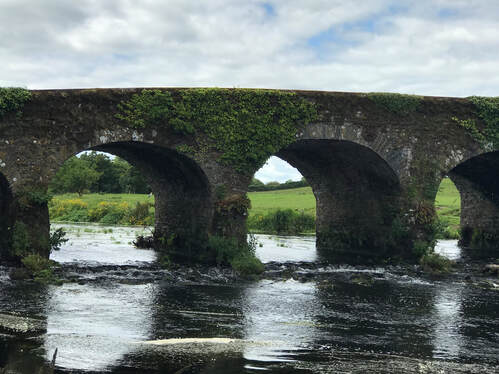 2 Corinthians 4:18 Seeing with the eyes of the heart 4:18 … we look not at what can be seen but at what cannot be seen; for what can be seen is temporary, but what cannot be seen is eternal. The other day I was sitting outside in the sun reading a book. Suddenly I had a huge urge to sneeze. When I sneezed, my whole body contorted and was propelled upwards by the force of the sneeze, as if an invisible power had taken hold of me and shaken me. As I sat back down, I could see droplets falling down all around me, shining in the sunlight, like a fine mist. I was amazed at how much moisture there was. No wonder we have been told to stay at home if we have a cold, or to make sure we sneeze or cough into a tissue. At that moment I could see how easily colds and flu and Covid-19 can spread. There is so much in this world that we cannot see. There is so much that is invisible to the human eye. Just because we cannot see it does not mean it is not there. Air for example: we are constantly breathing in and out air, without seeing it. We can see the trees swaying in the wind, but we can’t actually see the wind. We can only see the effect of the wind. Paul reminds us in 2 Corinthians 4:18 … we look not at what can be seen but at what cannot be seen; for what can be seen is temporary, but what cannot be seen is eternal. For we know that if the earthly tent we live in is destroyed, we have a building from God, a house not made with hands, eternal in the heavens. In 1 Samuel 8 -The people of Israel wanted to be like the other nations. They wanted a king to rule over them and fight for them. They wanted a king they could see not a God whom they could not see. They rejected God and chose a man. They chose to live by sight not by faith. They had their minds fixed on temporal things, not on eternal things, As followers of Jesus, we are reminded to see as God sees, to see the world as Jesus saw the world, to see ourselves as God sees us, to see with the Spirit, to see with the eyes of the heart. In the gospel reading today it appears that despite the amazing things that Jesus did, there were people who could not see what he did as good. … people were saying, "He has gone out of his mind." And the scribes who came down from Jerusalem said, "He has Beelzebul, and by the ruler of the demons he casts out demons." How could they say it was Beelzebul? How could they say he had gone mad? One of the strangest things in the world is that no matter how good a person is, no matter how good the things they do are, there are always those who will oppose. Those who oppose are often those who have the most to lose or those who want to hang onto power in some way. Their power and place and privilege are threatened. This is found in religion too where some want to control the lives of others and hang on to power. We like to put people in boxes. We like to give people labels. We diagnose people as mad. When we do so we are not seeing as God sees. As those who are part of the church, we must ensure that we are seeing as God sees, to see as Jesus saw the world, to see with the Spirit. Some people call this seeing with the eyes of the heart. Seeing from a place of love, from a place of kindness, from a place of wonder, seeing that originates in grace, seeing with compassion and understanding, seeing without judgement, without bias, without labelling and without categorising. Seeing with acceptance. To see with the heart*, we have to move from seeing with the ego of the mind. Sometimes we are full of our own importance, our own opinions, our ways. Sometimes our ego is threatened, and we fight back, retaliate, dismiss, put down the other and at other times our ego feels so small we give up and run away. When we acknowledge our ego and the trouble it can cause us and others, we then can pray to God that we might see with the eyes of the heart. This does not mean that we will see all things clearly or know all things, but instead see with the eyes of love. This is something to learn, to practice. It requires humility, following the example of Jesus, who humbled himself and became human like us, who humbled himself even to death on the cross. Today, as we gather around the table of Christ as his sisters and brothers, and we take his body and blood, we humble ourselves as Christ humbled himself for us. Lord let me see. Lord, let me see as you see. Open the eyes of my heart. Open me to love. May grace and love flow freely from within me, and when I am rejected or face opposition because of love, remind me that it is not me that who is being rejected but you. Lord, let me see. Let me see with the eyes of my heart. Amen. * Seeing with the eye of the heart - See 'The Wisdom of Jesus' by Cynthia Bourgeault Photo Murragh County Cork, Republic of Ireland |
AuthorMinister of Campsie Earlwood Clemton Park Uniting Church Congregation Archives
March 2024
Categories
All
|

 RSS Feed
RSS Feed
